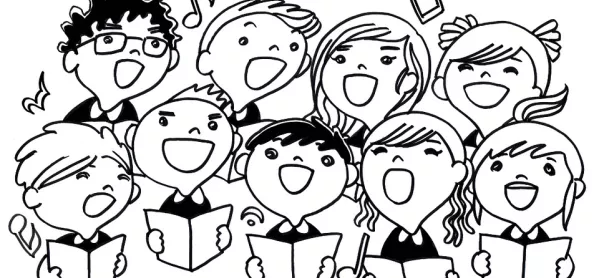Schools should bring back singing in assembly, concludes a report from the Royal Society. Evolutionary psychologist Robin Dunbar, one of its authors, reckons singing together – like dancing, playing physical team sports and storytelling – triggers the endorphin system and helps a community to bond. I wholeheartedly endorse his ambitious claims for the whole-school benefits of collective singing.
In a Tes piece, Zofia Niemtus recalls: “Hundreds of students sat cross-legged on the cold floor of the school hall, singing their hearts out about creatures great and small, keeping their oil lamps burning and imploring Jesus to shine.” Alas, she says, that tradition is fading out.
There are valid reasons why. In her halcyon vision, children were singing hymns – Christian songs of worship. Nowadays, unless your school boasts an explicitly Christian foundation and mission, let alone a chapel, foisting those texts on children of other faiths, or of none, is arguably hard to justify.
As a head in Wolverhampton in the 1990s, I wrestled with that problem. The school had a strong singing tradition, and students generally joined in heartily. Yet, reflecting its setting, the school was composed of nearly 30 per cent children from Indian Sikh backgrounds. Singing Fight the Good Fight seemed no longer appropriate.
Actually, the similarities between that hymn’s theological militarism and Sikhism’s khalsa might have intrigued my Sikh head boy at the time, Sathnam Sanghera. He’s now a high-profile journalist and author, currently educating the nation about racial awareness, past conflict and above all, about the white supremacist myopia that convinces many that they’re not apologists for Empire, and not racist at all. Even Sathnam cannot know quite how much he taught me about the life of a young British Indian whose Punjab-born parents had sought a better life here. They might have found it, but not without also encountering hardship and prejudice.
In short, my school abandoned hymns and The Lord’s Prayer in assembly. It was morally essential, but as a consequence, we lost the habit of singing together. And here’s the problem for school singing: if you reject hymns, what do you replace them with?
Getting several hundred people to sing together requires suitable music. Hymns are designed to be sung by crowds – congregations in that context. Sporting crowds furnish secular examples, good and bad. Watch Liverpool play at home, and you’ll hear the Kop crowd roaring out You’ll Never Walk Alone. It’s a strong tune, but its enormous range makes it nearly unsingable: schools would/should hope to do better than mere shrieking. Tellingly, Twickenham’s repertoire involves hymns of a sort, the spiritual Swing Low, Sweet Chariot and Jerusalem, Blake’s poem set by CHH Parry.
Songs from musicals remain popular: but Les Misérables is pitched extremely high. By verse two of Do You Hear the People Sing, most people will be croaking. Similarly, Queen’s We Are The Champions is extraordinary precisely because Freddie Mercury could scream top Cs: most can’t. Pop music (let’s not get hung up on styles) is, with few exceptions, written for a small group or solo voice and doesn’t adapt well to communal singing.
This isn’t about my middle-aged musical tastes or prejudices. Much as I love the Blues, classics recorded by Bessie Smith or BB King would transfer to the assembly hall even less readily than will Ariana Grande’s or Ed Sheeran’s latest hit. As a child, I sang songs from the National Songbook: I doubt Hearts of Oak or The Ashgrove would hack it in a 21st-century assembly.
For schools to rediscover the joy (it was a joy) of communal singing, they’ll need new non-religious material, purpose-written or arranged with punchy words and rhythmic melodies. Good examples are few: by contrast, hymn books offered hundreds in one volume. I reckon a school repertoire of 30 to 50 suitable songs that actually “work” (the oft-overlooked musician’s concern) would balance variety and familiarity.
How about a 21st-century National Songbook to bond communities of young people, helping them create common cause and enthusiasm to work together? Maybe, in a nation currently so divided, it is, as the Royal Society suggests, just what’s needed.
Dr Bernard Trafford is a writer, educationalist, musician and former independent school headteacher. He tweets @bernardtrafford





